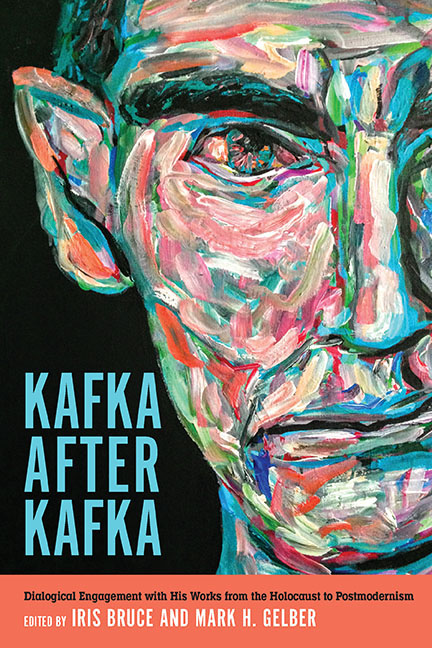Book contents
- Frontmatter
- Contents
- Acknowledgments
- Introduction
- Part I Philosophical and Literary Hermeneutics after the Holocaust
- 1 Tradition of Loss: Werner Kraft on Franz Kafka
- 2 A Brave New Word: Hannah Arendt's Postwar Reading of Kafka
- 3 Binding Words: Sarah Kofman, Maurice Blanchot, Franz Kafka, and the Holocaust
- 4 Kafka as the Exemplary Subject of Recent Dominant Critical Approaches
- Part II Kafka in Israeli Cultural Space
- Part III Kafka from Modernism to Postmodernism
- Notes on the Contributors
- Index
1 - Tradition of Loss: Werner Kraft on Franz Kafka
from Part I - Philosophical and Literary Hermeneutics after the Holocaust
Published online by Cambridge University Press: 12 April 2019
- Frontmatter
- Contents
- Acknowledgments
- Introduction
- Part I Philosophical and Literary Hermeneutics after the Holocaust
- 1 Tradition of Loss: Werner Kraft on Franz Kafka
- 2 A Brave New Word: Hannah Arendt's Postwar Reading of Kafka
- 3 Binding Words: Sarah Kofman, Maurice Blanchot, Franz Kafka, and the Holocaust
- 4 Kafka as the Exemplary Subject of Recent Dominant Critical Approaches
- Part II Kafka in Israeli Cultural Space
- Part III Kafka from Modernism to Postmodernism
- Notes on the Contributors
- Index
Summary
IN 1946, ESSAYS, POEMS, AND SHORT PROSE by Werner Kraft began to appear again in German magazines. Thirteen years earlier, when his employment as a librarian in Hannover was terminated, he had left Nazi Germany. His career had vanished into thin air; contacts with other poets, such as Rudolf Borchardt and Theodor Lessing, and with publishers and critics faded away. From 1934 on, Kraft lived in Jerusalem.
Most of the essays on Borchardt, Johann Wolfgang von Goethe, Heinrich Heine, Karl Kraus, and others that Kraft published in various German and Swiss magazines during the late 1940s, 1950s, and 1960s had been written in the years of his forced separation from the field of German literature between 1934 and 1945. This is also true for many of the short texts that compose his book Franz Kafka: Durchdringung und Geheimnis (Franz Kafka: Penetration and Secret), which was published by the German firm Suhrkamp in 1968. In the foreword Kraft notes: “The conception of this book dates back to the beginning of the 1930s. Over the years, several parts have appeared in magazines and newspapers. The final draft was written in the course of the last years.” The following remarks shed light on the character of Kraft's readings of Kafka, their poetological propositions as well as their historical context. These are, as I will show, closely connected.
Historical Background
Some of Werner Kraft's readings of Kafka's works had already been written when Kraft and Walter Benjamin met in Paris in 1933. At that time they had not been in touch for more than ten years. Benjamin's essay “Franz Kafka: Zur zehnten Wiederkehr seines Todestages” (1934; “Franz Kafka: On the Tenth Anniversary of His Death”)—the critic's most elaborate work on Kafka, which was revised many times, with abundant unpublished notes well documented in the critical edition of Benjamin's works—alludes to their conversations. Benjamin explicitly refers to Kraft's interpretations of “Der neue Advokat” (“The New Advocate”) and “Ein Brudermord” (“A Fratricide”). In a letter to Gershom Scholem written in early 1934 Benjamin described Kraft's “attempts at a commentary on short pieces of Kafka's” as “restrained and definitely not without insight.”
Information
- Type
- Chapter
- Information
- Kafka after KafkaDialogic Engagement with his Works from the Holocaust to Postmodernism, pp. 11 - 28Publisher: Boydell & BrewerPrint publication year: 2019
